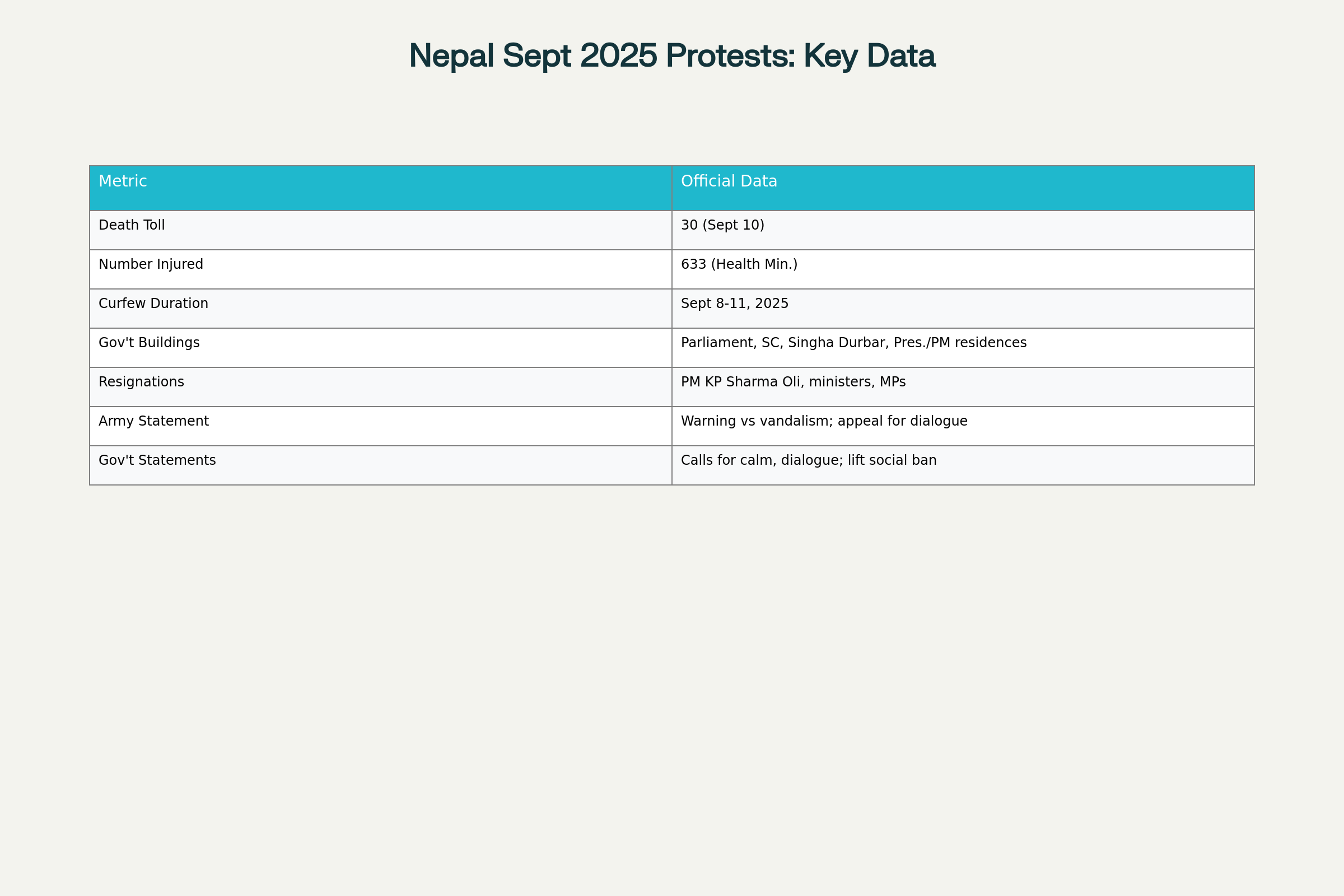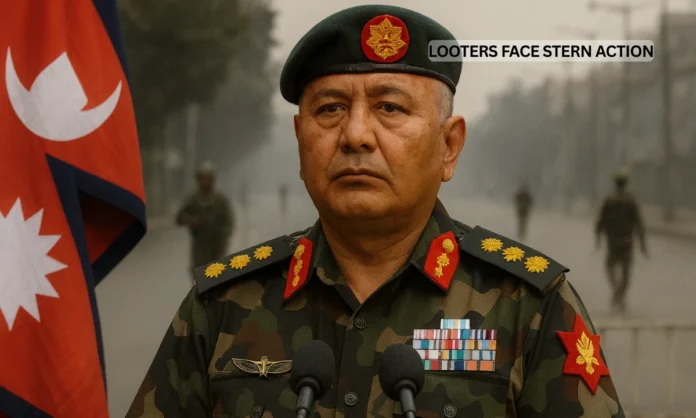Key Highlights:
- Nepal Army imposes indefinite nationwide curfew warning against vandalism, looting and attacks targeting individuals and property
- Death toll reaches 30 with over 633 injuries during Gen Z protests that forced PM KP Sharma Oli’s resignation
- Nepal Army Chief General Ashok Raj Sigdel appeals for dialogue while taking control of security at key government installations
Opening Overview
The Nepal Army has taken decisive action to restore order across the country, issuing sharp warnings against criminal activities disguised as political protests while extending a nationwide curfew to September 11, 2025. In an unprecedented intervention, Nepal Army Chief General Ashok Raj Sigdel addressed the nation, condemning groups that are exploiting the current crisis to engage in loot, attack and vandalism activities. The military’s statement comes as Nepal faces its worst political crisis in decades, with over 30 people killed and government buildings torched during Gen Z-led protests.
🇳🇵 | Nepal Army Chief General Ashok Raj Sigdel addresses the nation. pic.twitter.com/zp7XOwVoix
— Aprajita Nafs Nefes 🦋 Ancient Believer (@aprajitanefes) September 10, 2025
The Nepal Army’s warning specifically targets “lawless individuals and groups” who are committing acts of vandalism, arson, looting, and violent attacks in the name of the movement. This firm stance follows widespread destruction of government property, including the Parliament building, Supreme Court, and Singha Durbar administrative complex. The military has emphasized that any demonstrations, vandalism, looting, arson, or attacks on individuals and property will be considered punishable crimes subject to strict action.
Nepal’s security forces now patrol empty streets under an indefinite curfew as the country grapples with unprecedented political turmoil. The Nepal Army’s intervention marks a critical moment in Nepal’s democratic journey, with soldiers guarding key installations while appealing for peaceful dialogue to resolve the crisis.
Security Measures and Military Response Under Crisis Management
- Nationwide curfew imposed until September 11, 2025, with restrictive orders from morning to 5 PM daily
- Armed soldiers deployed to patrol streets and secure government buildings after civilian authority collapse
- Essential services including ambulances, fire engines, and health workers permitted to operate during restrictions
The Nepal Army has implemented comprehensive security measures across the country, taking control of law and order operations from civilian authorities. The restrictive orders remain in effect throughout Nepal from morning until 5 PM, followed by strict curfew enforcement until 6 AM the next day. This unprecedented military intervention was necessitated by the complete breakdown of civilian security apparatus during the violent protests.
General Ashok Raj Sigdel, the 58-year-old Nepal Army Chief who assumed command last year, has personally overseen the security operations. In his televised address to the shaken nation, the General emphasized the Nepal Army’s historical commitment to protecting Nepal’s independence, sovereignty, territorial integrity, and national unity. The military has taken control of critical locations including Kathmandu airport and the government secretariat building Singhdurbar, while closing all borders to prevent further escalation.
The Nepal Army’s statement reveals serious concerns about opportunistic criminal elements exploiting the political crisis. Officials have documented incidents of “vandalism and arson of personal and public property, looting, violent attacks on individuals, and attempted rape in the name of the movement”. This disturbing development has prompted the military to issue strict warnings against any activities that target ordinary citizens and public property under the guise of political protest.
Security personnel have been authorized to take immediate action against violators, with clear instructions to treat any form of demonstration, vandalism, or attacks as criminal activities. The Nepal Army has also requested citizens to coordinate with nearby security officials for necessary facilitation during the restrictive period, emphasizing the need for public cooperation to restore normalcy.
Political Crisis and Government Collapse Following Mass Protests
- Prime Minister KP Sharma Oli resigned after violent Gen Z protests claimed 30 lives
- Multiple ministers and MPs submitted resignations taking moral responsibility for the bloodshed
- President Ram Chandra Paudel begins process of forming new government amid unprecedented chaos
The political landscape in Nepal has completely transformed following the resignation of Prime Minister KP Sharma Oli on Tuesday afternoon. Oli’s departure came after the 72-year-old leader could no longer maintain control as protesters stormed government buildings and demanded his immediate ouster. In his resignation letter, Oli stated he was stepping down “to facilitate a solution to the problem and to help resolve it politically”.
The crisis began when the government imposed a ban on 26 social media platforms, triggering massive Gen Z-led demonstrations across the country. What started as protests against social media restrictions quickly evolved into a broader anti-corruption movement targeting political elites and their privileged lifestyles. The protesters, calling themselves Gen Z, highlighted the stark contrast between politicians’ lavish living conditions and ordinary citizens’ struggles.
The government’s heavy-handed response escalated the situation dramatically, with security forces using tear gas, water cannons, rubber bullets, and live ammunition against demonstrators. The death toll has now reached 30 according to UN reports, with Nepal’s Health Ministry confirming 633 injuries during the violence. Home Minister Ramesh Lekhak and Agriculture Minister Ramnath Adhikari resigned earlier, taking “moral responsibility” for Monday’s bloodshed that left 19 protesters dead.
The protests targeted multiple government installations, with demonstrators setting fire to the Parliament building, Supreme Court, President’s residence at Sital Niwas, and PM’s residence at Baluwatar. Party headquarters of major political organizations were vandalized, with protesters stripping and burning party flags while demanding systemic political reform. The unprecedented scale of destruction forced political leaders to evacuate via helicopter as their homes came under attack.
Nepal Army’s Appeal for Dialogue and National Reconciliation Efforts
- General Sigdel urges protesting groups to halt demonstrations and engage in peaceful talks
- Nepal Army expresses deep condolences for loss of life while appealing for protection of national heritage
- Military emphasizes commitment to facilitating peace and mutual conciliation between all parties
Nepal Army Chief General Ashok Raj Sigdel has emerged as a key figure in efforts to restore stability, making direct appeals to protesters for dialogue and reconciliation. In his nationally televised address, the General stated: “We appeal to the protesting group to halt protest programmes and come forward for dialogue for a peaceful way out for the nation”. This measured approach reflects the Nepal Army’s attempt to balance security concerns with democratic principles.
The military leadership has expressed genuine sympathy for the victims of the crisis, with Sigdel offering condolences over the loss of lives and property during the violence. The Nepal Army’s statement emphasizes the need to “normalise the present difficult situation and protect our historical and national heritage and public as well as private property, and to ensure safety to the general public and diplomatic missions”. This comprehensive approach addresses both immediate security needs and longer-term stability requirements.
President Ram Chandra Paudel has officially accepted Oli’s resignation and begun the process of selecting a new leader to form the government. The President has urged all sides to remain calm and resolve the crisis through dialogue, emphasizing that citizens’ demands can be addressed peacefully in a democratic system. Meanwhile, the Nepal Army has positioned itself as a potential facilitator for peace negotiations between different factions.
International organizations have also called for restraint and dialogue to resolve the crisis. UN Secretary-General António Guterres expressed deep sadness over the loss of life and urged authorities to comply with human rights law while ensuring protests remain peaceful. The United Nations human rights chief Volker Türk warned that “violence is not the answer” and called for de-escalation from all parties.news.
The Nepal Army’s approach reflects careful consideration of constitutional limitations while addressing urgent security needs. General Sigdel has indicated the military may act as a facilitator to promote peace and mutual conciliation, though specific details about potential dialogue mechanisms remain unclear. This delicate balance between military intervention and democratic processes will be crucial for Nepal’s future stability.
International Response and Regional Security Implications
- UN Secretary-General calls for dialogue and thorough investigation into violence against protesters
- India expresses concern over Nepal’s stability emphasizing regional importance
- International Crisis Group labels situation as major inflection point in Nepal’s democratic experience
The international community has closely monitored Nepal’s crisis, with major powers and organizations calling for immediate de-escalation. UN Secretary-General António Guterres issued a statement expressing deep sadness over the loss of life and urging all parties to exercise restraint. The UN chief specifically called on authorities to comply with human rights law while ensuring that protests take place peacefully, respecting life and property.
UN human rights chief Volker Türk has been particularly vocal about the excessive use of force against largely young demonstrators. In his statement from Geneva, Türk expressed being “appalled by the escalating violence” and condemned the “unnecessary and disproportionate use of force” by security personnel. The UN official emphasized that dialogue is the best and only way to address concerns of the Nepalese people, particularly ensuring young voices are heard.
India, as Nepal’s immediate neighbor, has expressed significant concern over the developments. Prime Minister Narendra Modi stated that the “stability, peace and prosperity of Nepal are of utmost importance to us,” highlighting the regional implications of the crisis. The statement reflects India’s strategic interest in maintaining stability along its northern borders and preserving bilateral relationships.
The International Crisis Group has characterized the current situation as a “major inflection point in the country’s uneasy experience with democratic rule”. This assessment underscores the broader implications of the crisis for Nepal’s democratic trajectory and regional stability. Constitutional lawyer Dipendra Jha has suggested that protesters, trusted leaders, and the Nepal army should collaborate to establish a caretaker government.

Official data points on Nepal protests and government/army response September 2025
Closing Assessment
The Nepal Army’s stern warning against loot, attack and vandalism activities represents a critical juncture in the country’s political evolution, as military leadership attempts to restore order while preserving democratic principles. General Sigdel’s balanced approach of imposing security measures while appealing for dialogue demonstrates the complex challenges facing Nepal as it navigates its worst political crisis in decades. The death toll of 30 people and over 633 injuries serves as a sobering reminder of the human cost of political instability, making the Nepal Army’s intervention both necessary and controversial.
The resignation of Prime Minister Oli and the subsequent power vacuum have created unprecedented challenges for Nepal’s democratic institutions, with the Nepal Army now serving as the primary guarantor of stability. The military’s warning specifically targets criminal elements exploiting the political crisis for personal gain, distinguishing between legitimate political protest and opportunistic criminal activity. This nuanced stance will be crucial as Nepal works toward establishing a new government while addressing the underlying grievances that sparked the Gen Z protests.
The international community’s calls for dialogue and restraint align with the Nepal Army’s appeal for peaceful resolution, suggesting potential pathways forward through negotiated settlement. However, the success of such efforts will depend on the willingness of all parties to engage constructively while the Nepal Army maintains its role as facilitator rather than permanent ruler. The coming days will determine whether Nepal can emerge from this crisis with strengthened democratic institutions or face prolonged military oversight.


